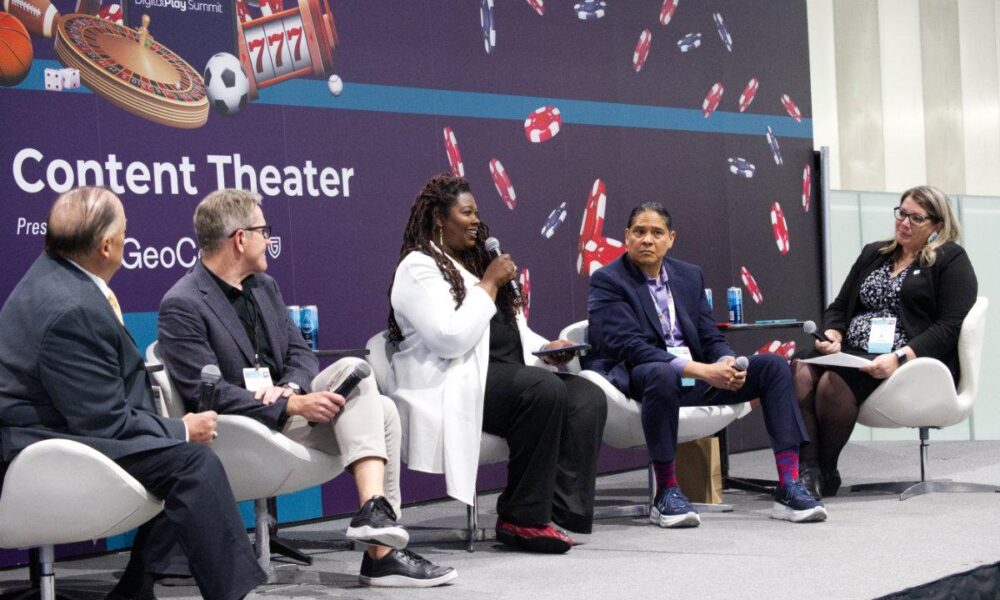The blueprint for tribes to have digital success is assembling the right team for innovation. It’s vital for tribes to learn how to recruit, train, and structure a team capable of driving innovation in igaming, sports betting, and emerging technologies, according to a panel discussion at the Indian Gaming Association Tradeshow & Convention.
The panel, moderated by Kelly Myers, director of governmental affairs with Gaming Laboratories International, included Daron Dorsey, president and CEO of AGEM; Anika Howard, CEO of Wondr Nation; Jonodev Chaudhuri, principal at Chaudhuri Law; and Dave Vialpando, executive director of the Pala Gaming Commission.
There’s a lot on the plate for tribes to consider these days. The industry is evolving from its mechanical origins into a digital framework. It’s all about software.
“It is a technology industry now and not a gaming industry,” Dorsey said. “Any kind of innovations happening in the other consumer parts of our ecosystem are already in our gaming system or are coming. The most important part is how we regulate that in this licensed environment and which things do and don’t require regulatory oversight. The more things we don’t because they don’t touch on a regulatory function we’re going to see advancement much quicker.”
Myers said GLI is receiving a lot more questions about product certifications on how technology can interface with back-of-house systems or with a players club or something else. “We’re having to evaluate that a lot more and it seems like it’s such a new product and how do we classify it.”
Chaudhuri said the Indian Gaming Regulatory Act passed by Congress in 1988 makes it clear that their intent wasn’t to limit tribes’ ability to provide products. Language allows tribes to provide electronic aids in the delivery. “The compacting clauses aren’t supposed to limit the tribes’ ability to provide products and services,” Chaudhuri said.
When it comes to assembling a digital team, Howard responded to whether it’s better to build one in house or outsource it by saying there are benefits and negatives to whichever way you go.
“A hybrid approach is needed,” Howard said. “At the core, you need resources in-house that understand the technology and can be the translator to what the business requirements are, what you’re trying to accomplish, and the technical teams that are going to deliver that.”
Howard said operators that know they have some runway before a launch can have it in-house and outsource to experts to assist and build strategy. What they’re seeing now, however, is that from a delivery, technology, and gaming standpoint, you don’t need to be all things to all people. It’s understanding where the gaps are and creating the opportunities for what you want to build and grow in-house. For other things, you don’t need to reinvent the wheel; they can be outsourced.
“You see that a lot with game developers. You don’t have to create a game development team in-house. So many amazing gaming developers already exist,” Howard said. “You have to understand where you want to spend your time and money and whether that’s going to be core to your business — whether that’s going to be building your platform, having a market access partner, or putting an in-house team together.”
The final part is looking at the total cost of ownership, Howard said. Building an in-house product and team requires not only bringing it to market, but keeping it competitive and continuing to grow.
“It’s not just that initial investment,” Howard said. “It’s the research and development, marketing, and training. For me, there are pros and cons for both. But in the best of both worlds, it’s understanding your strategy and creating a hybrid approach that allows you to have the team you need and have them understand what’s required to fill those gaps in places that are not the expertise of your organization.”
Vialpando, the former executive director of the Pokagon Band Gaming Commission for the Pokagon Band of Potawatomi Indians of Michigan and Indiana, agreed that a hybrid approach is the best way forward. He has experience in both, including working for a tribe as a regulator where the tribe decided to build from the ground up with subject-matter experts. In Michigan, the tribe opted for an established platform provider and established content.
“There are pros and cons to both,” Vialpando said. “The caveat of course is IGRA’s property-management restrictions and also that you’re not going to outsource the regulations. I will tell you from a regulator perspective, having a solution that’s custom built enables the regulator to build in the processes — audits, compliance, and responsible-gaming metrics. But it’s probably easier if the money is there to outsource with established entities.”
In Michigan, Vialpando related an experience of outsourcing sports betting with a foreign-based company. The tribe thought they did a good job of sharing its regulations with the operator, but the platform provider changed the system and triggered a regulatory violation.

“If you do outsource, particularly from a tribal perspective and it’s going to be regulated by the tribe — and not all do — it’s making those service, content, and platform providers aware of the regulatory construct so they don’t find themselves in violation,” Vialpando said.



